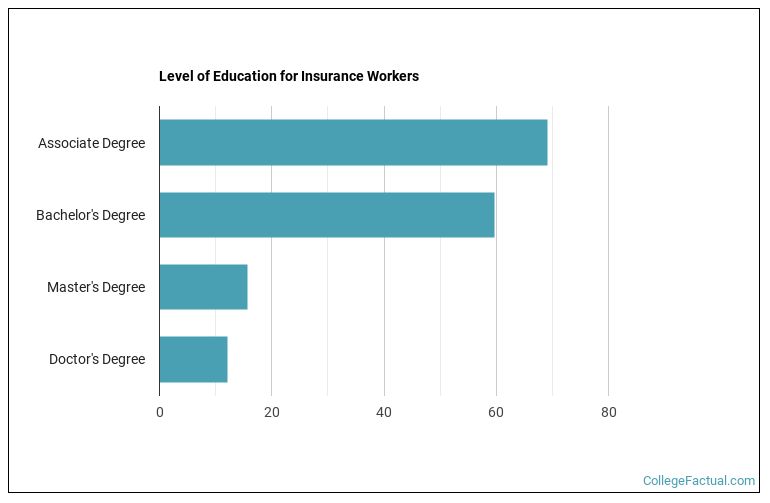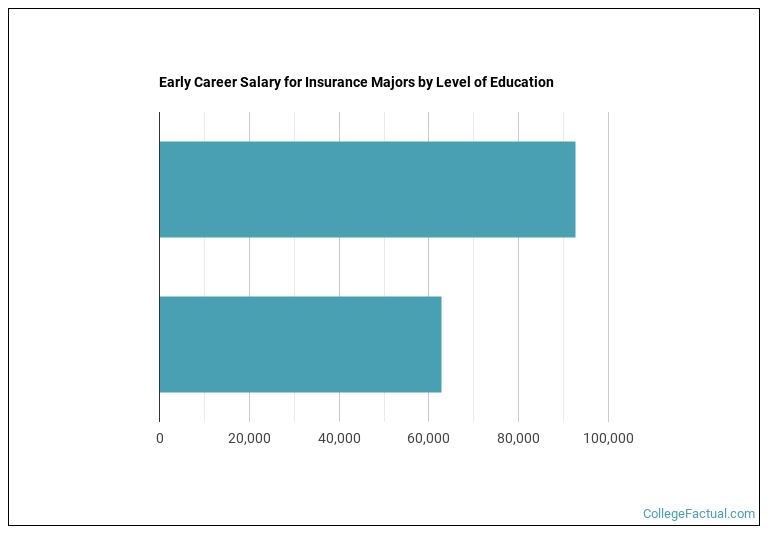 by our College Data Analytics Team
by our College Data Analytics TeamInsurance serves a vital function in businesses by assessing and protecting against risk. If you are interested in the field of Risk Management for Businesses, Insurance may be a good major for you.
There are different kinds of risk associated with business. Whether it be your employee getting hurt on the job, or inventory is damaged or stolen; these situations can all be elucidated by risk management. Risk management is a form of insurance, which will protect companies against injury and loss. If you pursue a degree in insurance you will learn handle risk and provide insurance and risk management for business, organizations, and individuals.
While studying this major, you will take various courses on health care financing, retirement plans, life and health insurance, risk management, employee benefits, and principle of insurance. This major is commonly offered as a Bachelor's degree.
In 2021-2022, insurance was the 201st most popular major nationwide with 1,737 degrees awarded. Our 2025 Best Insurance Schools ranking analyzes 27 of these schools to determine the best overall colleges for insurance students. Explore this or one of our many other custom insurance rankings further below.
Strong people skills will help you achieve success in this major and a future career. You will be working directly with many different clients; in order to understand their needs and concerns it is important to be personable and trustworthy. Relationship building will be part of the job.
Mathematical skills are required to match and calculate prices, as well as to assess risk and the cost of possible damaging situations. If this is a field that interests you, prepare for it while still in high school. Take courses in business, accounting, economics, statistics and computer applications if they offered at your school.
New students will need to have completed high school or a GED program and each school will have their own minimum GPA and SAT/ACT test requirements. Once you obtain your degree, additional insurance certifications required to pursue a career in this field.
There are various different levels of insurance degrees. Insurance programs offered by schools range from a to a , which is the highest insurance degree you can get. Different insurance degrees vary in how long they take.
| Degree | Credit Requirements | Typical Program Length |
|---|---|---|
| Associate Degree | 60-70 credits | 2 years |
| Bachelor’s Degree | 120 credits | 4 years |
| Master’s Degree | 50-70 credits | 1-3 years |
| Doctorate | Program required coursework including thesis or dissertation | At least 4 years |
A bachelor's degree is the most common level of education achieved by those in careers related to insurance, with approximately 42.0% of workers getting one. See the the most common levels of education for insurance workers below.
| Level of Education | Percentage of Workers |
|---|---|
| Bachelor’s Degree | 42.2% |
| Doctoral Degree | 16.8% |
| High School Diploma | 10.7% |
| Associate’s Degree (or other 2-year degree) | 8.5% |
| Some College Courses | 7.9% |
59.6% of insurance workers have at least a bachelor's. See the chart below for the most common degree level workers in insurance have received.

The education level required is different depending on the insurance career you are seeking.
Insurance is necessary for everyone; therefore graduates with a degree in Insurance will have many opportunities within this field. One quickly growing field is that of Insurance Sales Agents. These agents are professionals who assist individuals and companies to choose which insurance policies match their needs, in terms of their lives, property, and health.
Another popular field is to become an Actuary. Actuaries determine how likely various events are going to occur. They take that information and create different plans to fit individuals and companies. Additional career options include Insurance Underwriters, Personal Financial Advisors, Claims Adjuster, Examiners, and Investigators.
Want a job when you graduate with your insurance degree? Insurance careers are expected to grow 5.7% between 2016 and 2026.
The following options are some of the most in-demand careers related to insurance.
| Occupation Name | Projected Jobs | Expected Growth |
|---|---|---|
| Insurance Sales Agents | 551,200 | 9.9% |
| Claims Adjusters, Examiners, and Investigators | 306,700 | -1.4% |
| Business Professors | 123,000 | 18.0% |
| Insurance Underwriters | 98,600 | -5.3% |
| Auto Damage Insurance Appraisers | 18,500 | 5.1% |
Insurance graduates between <nil> reported earning an average of $64,814 in the <nil> timeframe. Earnings can range from as low as $44,792 to as high as $144,715. As you might expect, salaries for insurance graduates vary depending on the level of education that was acquired.

Salaries for insurance graduates can vary widely by the occupation you choose as well. The following table shows the top highest paying careers insurance grads often go into.
| Occupation Name | Median Average Salary |
|---|---|
| Business Professors | $103,330 |
| Insurance Underwriters | $76,880 |
| Insurance Sales Agents | $67,890 |
| Claims Adjusters, Examiners, and Investigators | $67,540 |
| Auto Damage Insurance Appraisers | $65,510 |
With over 166 different insurance degree programs to choose from, finding the best fit for you can be a challenge. Fortunately you have come to the right place. We have analyzed all of these schools to come up with hundreds of unbiased insurance school rankings to help you with this.
One of 21 majors within the Business, Management & Marketing area of study, Insurance has other similar majors worth exploring.
| Major | Annual Graduates |
|---|---|
| Insurance | 1,737 |
| Related Major | Annual Graduates |
|---|---|
| Business Administration & Management | 403,753 |
| Accounting | 93,982 |
| General Business/Commerce | 56,779 |
| Finance & Financial Management | 54,690 |
| Marketing | 52,078 |
Image Credit: By Nick Youngson under License More about our data sources and methodologies.